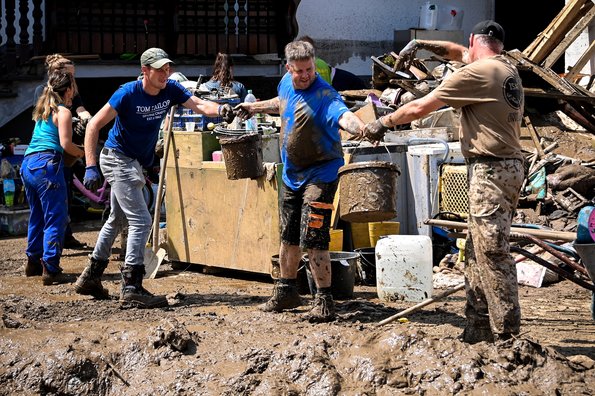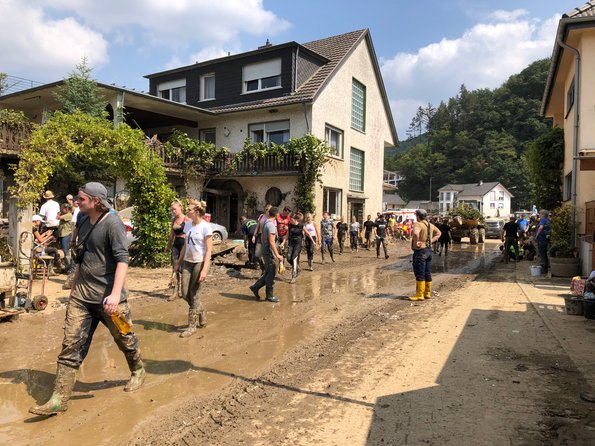Heavy rain and flood disaster in Germany – an interim assessment
by Karl-Jürgen Müller
In the week from 11 to 17 July 2021, Germany, Belgium, Luxembourg, and the Netherlands, but also Austria and Switzerland, were hit by very heavy rainfall, resulting in some catastrophic flooding and landslides. Many lives were lost. This time, regions in the German states of Rhineland-Palatinate and North Rhine-Westphalia, but also in Bavaria and Saxony, were particularly hard hit. The media have reported extensively, pictures of the catastrophe, the destruction and devastation have reached people worldwide. Here, without claiming to be exhaustive, we will merely give and interim assessment.
Sympathy and condolences, as well as the willingness to provide help, go to the relatives of the many fatalities and those still missing, to the many injured, to the many thousands of people, some of whom have lost all their belongings.
Overwhelming willingness to help
And indeed, sympathy and compassion have been demonstrated in view of the disaster. Yes, there are also the “curious” obstructing the relief workers and sometimes even putting themselves in danger – and also a few looters. But the scope and extent of the real help provided is once again overwhelming – enormous donations in kind and money stand alongside the energetic help of many on the ground. Volunteers, but also helpers from the fire brigades, the German Federal Agency for Technical Relief (THW), the German Red Cross (DRK), the German Lifesaving Association (DLRG), the police and the Bundeswehr have done a great job. A quote from the “Mittelbayerische Zeitung” of 17 July expressed it well: “A glimmer of hope in these gloomy times is the support offered and provided by other federal states, by local authorities and volunteers, and also from abroad. In times of need – and not in fine Sunday speeches – we can see what real cohesion and solidarity are about. With this spirit, this commitment, Germany will also withstand this terrible test by the forces of nature.”
Difficult search for causes
Of course, the question of the causes and possible lessons to be learned from the disaster is also raised. Here opinions differ, and one can get the impression that it is not always just about the cause, but also about other motives. After all, Germany is in the middle of a federal election campaign, and the EU Commission has just adopted a very extensive “climate protection programme”.
Yet it is still relatively easy to explain the acute weather situation in a scientifically serious way. But opinions differ even on the question of the connection between the rainfall and the floods and landslides. While some say that human intervention in nature, for example the sealing of soil surfaces, is the problem, others emphasise that this played a “clearly subordinate role” in the places most affected by the disaster.1
The question of whether the disaster control warning systems worked adequately is also controversial. It is justified to again consider supplements to the widespread electronic systems, for example sirens.
Beware of the climate change claim
Whether it really serves the cause to establish a direct link between the disaster and climate change, as numerous politicians of almost all parties and many media have done, is questionable. The German radio station Deutschlandfunk asked a number of scientists about the connections between climate change and the persistent heavy rain.2 None of the scientists questioned climate change, but when asked about the direct connections, many of them were rather cautious. One example: Sebastian Sippel, senior researcher in the Climate Physics Research Group at the Institute for Climate and Atmosphere at ETH Zurich said: “It is still very difficult to causally attribute individual events to climate change. This is probably also true for the current heavy rain.” The scientists do see connections between a long-term increase in temperature and specific weather events. They say that warmer air can absorb more water vapour before it rains down. In concrete terms: air that is 1 degree Celsius warmer can absorb 7 per cent more water. So there can be more water when it rains. Or: If the temperature difference between the poles and the equator decreases, the flow velocity of the air masses also decreases and, in result, longer-lasting weather conditions such as heat or rainy weather are more likely to occur. But to draw direct conclusions from such statements for an event like the one in the week from 11 to 17 July is probably quite daring. Many concrete questions have not yet been scientifically clarified.
What we can do in future
There is no reason not to do something about air, water and global warming – as far as that is possible. Here, too, there are still open questions. But anyone claiming today that he (or she) could prevent events like the natural disaster in Germany in the future with his climate protection programme, is a quack.3 Jürgen Jensen of the Institute for Water and Environment was asked by Deutschlandfunk: “What could have been done to prevent the loss of human life and the destruction of buildings and roads?” His answer was: “That’s a difficult question, I’m afraid you can’t prepare for it sufficiently. It is more of a natural disaster in that case than it was a controllable weather event.”
Which is not to say that there is nothing we can do in future. In the same interview, the same expert mentions better personal precautions, including sensible behaviour in the event of a disaster (unfortunately, there were also people who went back into their houses despite clear warnings and were harmed). Precautions can also be taken when planning and building, for example, by avoiding endangered areas.
Finally, civic engagement, especially among young people, deserves to be supported and strengthened. Young people in the volunteer fire brigade, the German Red Cross or the scouts can not only learn to provide meaningful help, even in the event of a disaster, but also strengthens their entire personality by such involvement.
Prevent man-made disasters
One last thing: This time, Germany has been hit particularly hard. The images of destruction and devastation in individual localities are reminiscent of images from other parts of the world to which we have perhaps already become too accustomed. Catastrophes that are even greater in scale. Also, images from regions where the destruction and devastation are obviously due to human behaviour. Most strongly where wars are raging. Here, human beings, those responsible, can indeed do something to end suffering, to end it immediately. And prevent in advance such man-made catastrophic events from happening in the first place.
The flood disaster in Germany and its neighbouring countries is another occasion to pause and reflect on what really is important in life and how we want to live in future. •
1 Thus Jürgen Jensen of the Institut for Water and Environment in an Interview with Deutschlandfunk of 15 July 2021; https://www.deutschlandfunk.de/forscher-zu-unwetter-katastrophe-risiko-fuer-solche.676.de.html?dram:article_id=500356
2www.deutschlandfunk.de/klimawandel-oder-nur-wetter-was-die-wissenschaft-dazu-sagt.1939.de.html of 16 July 2021. A report by Bayerischen Rundfunk of 13 July argues similarly: “For a single event, however extreme, it is impossible to say that climate change was the cause.” (https://www.br.de/wissen/wetter-extremwetter-klimawandel-100.html)
3 There are also media that have realised this. For example, the German newspaper Welt am Sonntag wrote on 18 July 2021: “Quite a few politicians are trying to politicise the floods in a confrontational way. This will hardly work. [...] Those who want to charge politics and intellectual life with alarmism will lose.” And the NZZ am Sonntag of the same day wrote: “The relatives of the victims and the citizens of the devastated villages will need help to find their way and to rebuild destroyed existences. What they don’t need are climate activists in politics, the media and, unfortunately, also in science, who see in the catastrophe above all the confirmation of their own climate-political world view: We’ve always told you so. Those who talk like this declare extreme events to be educational measures [...].” A day earlier, the Belgian newspaper “De Standaard” had already written: “This should be a time for aid, not for political gimmicks, let alone mutual accusations.”

